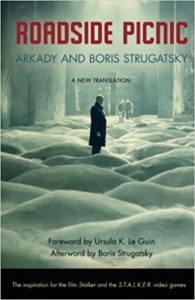 Roadside Picnic, by Arkady & Boris Strugatsky
Roadside Picnic, by Arkady & Boris Strugatsky
Synopsis: A loner tries to make a living scavenging & smuggling alien artifacts from a restricted zone.
Book Review: Well this was a neat read.
First, the protagonist isn’t a typical, relatable protagonist. He’s abrasive and selfish, and I started out not liking him. But that’s OK, not every protagonist has to be you standard Good-aligned Hero, sometimes it’s nice to break away from all the cliché heroes. And by the time I got to know the world he lives in, I developed sympathy and understanding for him, despite a distinct lack of admiration.
Which brings me to the next interesting aspect – this novel is Soviet AF. All the institutions are maximally Inadequate while still keeping themselves from collapse (though you get the feeling they’ll get there in a few decades). Everyone is only looking out for themselves, and using whatever power they have to advance their own interests regardless of how much it screws the rest of their institution/society/anyone-else. Mid-level bureaucrats collude directly with the criminals they’re supposed to be apprehending (when those criminals have enough money and pull). There’s literally nothing you can count on. It was a heck of an experience to be placed in that world and realize there are still vast swaths of humanity that live like this. Very saddening too.
And the whole concept of humanity trying to reverse-engineer the discarded remnants of incredibly advanced and randomly-deadly technology in a large unpoliceable area, while others try to steal it, made for good plot. It felt very much like a precursor to the Annihilation vision of Area X & The Institute. I dunno if Jeff VanderMeer was directly influenced by this novel, but it’s certainly a fine pedigree if so!
I think the biggest downside is the POV-switch near the middle of the book, which was unnecessary and distracting. In addition, the character we shift to feels far too similar our main protagonist, they’re basically the same person in different situations. The novel drags a bit at this point, I was glad when that chapter was done.
But probably the most interesting thing about this book is the ending. I won’t spoil it, but I will say that it leaves a major interpretation up to the reader. I know there are people who hate this sort of thing. But I really, really liked it. I was not expecting that at all, and I appreciate the trust the authors put in me to “get it.”
Recommended.
Book Club Review: This is a good book for book clubs for a number of reasons. For starters, it’s really short. It comes from the days of novels that averaged 150 pages, and by today’s standards that feels like a walk in the park. People shouldn’t have trouble reading it, which always helps turnout.
It also presents us with a world we can relate to, but from a different enough perspective to get people talking. The view from Soviet Russia is bleak, and it led to disagreements both about the character of our protagonist (we had several readers who considered him a good person!), and reflections on our own institutions. The fact that it was written 40 years ago also reminded us that the past is a different country and got us talking about that (people smoked indoors? and just ashed on the carpet?? OMG)
And the open-ended ending gave us a hell of a hook to talk about. Everyone put forward their own interpretation/prediction of what would follow, and defended it with evidence from the story (mostly having to do with the protagonists character and desires). Of course, only the ones who agreed with me were right. ;) But it was the joy of the discussion that matters. Recommended.
(also of note, this book was the inspiration for the STALKER video game)

I was also a big fan of this book.
Not sure if you read the author’s notes, but he provides an interesting discussion of the difficulties he faced getting this through the various approves of the Soviet Union, at least some of whom felt the author didn’t do enough to clarify this book correctly reinforced Soviet Principles in the war against capitalism.
It gave me a new appreciation for the level of frustration authors faced in getting their work published at the time.
Like